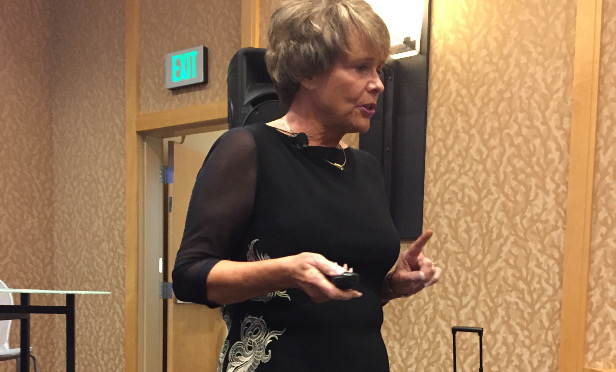 Harmon said even the smallest groups can be a tribe, but they can be very fragile.
Harmon said even the smallest groups can be a tribe, but they can be very fragile.
SAN DIEGO—Positive language that recognizes and appreciates employees can turn a company’s culture around and lead it to success, no matter what its size, ARM/My Coach LLC principal Kathy Harmon told attendees at IREM’s Fall Conference here Friday. Harmon led an 18-minute iTalk session entitled “The Language of Your Tribe Drives Your Culture” that addressed the importance of language in establishing and changing culture within a tribe or organization.
Harmon touted author Dave Logan’s book Tribal Leadership as pivotal to her altered view of the world, which centers on how people perform. “How people perform correlates to how their situations occur to them,” she said. “How language is used affects how we see things.” The word “tribe,” while it can be used to denote a rather large group, can also apply to smaller groups, which Harmon called “very fragile.” She spoke of the five stages people in tribes—workers, really—may go through, from negative and self-centered to positive and other-centered. Stage 1 was defined as “Life sucks,” and people in this group are very fatalistic and feel that life is unfair. Harmon recommends you don’t hire them. Stage 2, “My life sucks and I want yours to as well” is the next stage. Stage 3 is, “I’m great and you’re not,” which is where 48% of the population lie. Stage 4 is, “We’re great”; we share a common enemy, and it’s all about “we”—people in this stage are 30% more productive than people in Stage 3. Finally, Stage 5 represents only about 2% of the population, those who go on to do great things that affect large groups of people (think Gandhi).
“Your role as leader is to model Stage 4 behavior,” said Harmon. “Recognize that small groups are fragile, and don’t hire Stage 1s or Stage 2s or they will drag your culture down.”
As part of Stage 4, Harmon said, leaders should discuss the firm’s core values and create nurturing relationships. “Put people into groups of three; change their socialization patterns.” She recommended listening to the language they use in the workplace and reading their work emails to get a feel for this.
More advice? “Help them understand the stages, but be careful of labels,” said Harmon. “Have lots of conversations. Sell them on the idea of ascending to the next level. They need to have an epiphany, and the world will occur to them differently. Help them get unstuck.”
Signs of success for this approach are that employees’ language will change, there will be more collaboration, more appreciation and a less-stressful environment where they want to come to work every day; they will also be more productive and healthier, she said.

















 Copyright © 2024 ALM Global, LLC. All Rights Reserved.
Copyright © 2024 ALM Global, LLC. All Rights Reserved.